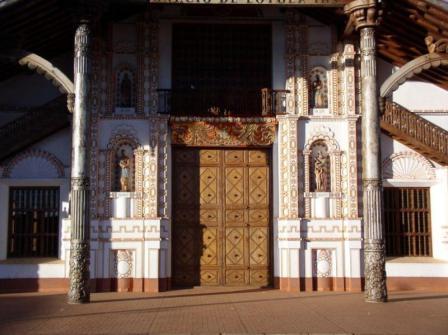|
Jesuit Missions of Bolivia: San Ignacio San Ignacio de Loyola de Velasco (not to be confused with the other mission town San Ignacio de Moxos, in the department of Beni) was established in 1748 under Friars Miguel Areijer and Diego Contreras and is the largest of the towns found along the Jesuit Mission circuit. Because it is located near the border with Brazil, it is also very commercially active.
Photo ©2003-forever
Dr. Daniel Beams
San Ignacio is also the principal entry point to Noel Kempff National Park. Its original church was destroyed in 1974, and replaced by a new one; however its altar and parts of the new building were saved from the original church. It is very beautiful and its population has done a good job of maintaining colonial customs and traditions. There are several workshops here where you can watch as pottery, hammocks, embroidery, leather items, and carved wooden furniture and ornamental items are created by local artisans. Nearby communities have also maintained many of their indigenous customs. Spanish is the most commonly used language among the town's 13,000 inhabitants; however, some also speak Portuguese because San Ignacio is so close to Brazil. The most common indigenous language in San Ignacio and surroundings is Chiquitano. There are also some Germans and a few Mennonite families in the area. Make time to see the church’s spectacular altar, considered the most ornate in the entire Chiquitos region. Its sacristy is also beautiful. From here you can take day trips to San Miguel, Santa Ana, and San Rafael, three of the other towns on the Jesuit Mission circuit. From here you can also travel to San Javier on a gravel road, and from San Javier to Santa Cruz by paved highway. It is locates 175 kilometers from Concepción. There is a nice central plaza in front of the church. Many thanks to Geoffrey A.P. Groesbeck who dedicated many years, clearly much love, and an entire website to this unique region of Bolivia, for sharing this page on Bolivia's Jesuit Missions.     |
